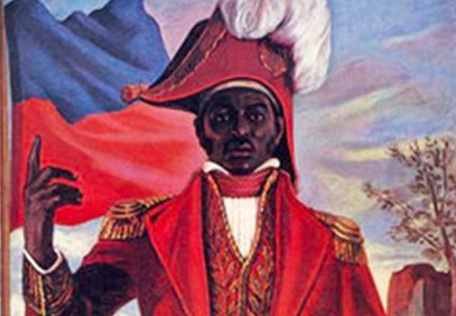General JanJak Desalin–routed French army
November 18, 2013 marked the 210th anniversary of the final battle of the Haitian Revolution, Batay Vètyè, or the Battle of Vertières.
In this sustained hostile engagement, the exceptionally talented and indomitable military of the stout-hearted General JanJak Desalin also known as Jean Jacques Dessalines, defeated France under Napoleon Bonaparte.
This final battle took place in Vètyè, which is located in Nord, Haiti. The Haitian military, by October 1803, had practically reclaimed the entire land of Ayiti (Haiti) for its Black and original inhabitants. As the Haitian military seized Vètyè, the contemptibly timid French general, Donatien-Marie-Joseph de Vimeur, vicomte de Rochambeau, along with his poltroon White troops surrendered and conceded victory to a group of people who they erroneous thought were inferior.
Batay Vètyè forever changed the economic reality and socio-political development of the world as the capitalist European empires along with the United States had no choice but to abolish the slave trade in hopes of preventing another Haitian Revolution within their own colonial territories.
Numerous countries throughout the Americas immediately followed the example of the Haitian Revolution and claimed their sovereignty and independence from European colonial empires.
Furthermore, Napoleon had to relinquish his dream of an American Empire by selling the Louisiana Territory to President Thomas Jefferson of the United States. As a result, the Louisiana Purchase doubled the size of the United States and augmented its wealth and power. Ultimately, the United States became a major world power as evident in 1815 with the advent of Manifest Destiny and in 1823 with the Monroe Doctrine.
However, by the late 19th century, as had been the case in the late 15th century, Europe again started to look at Africa to power its economic, political, and cultural growth. Thus, by 1885, the European empires devised an upgraded tool of capitalism called imperialism and started to carve Africa for their own economic covet for land, labor, and resource.
At the Berlin Conference, Africa was carved out like a pie and shared among the European countries. As Europe was desecrating Africa, the imperialistic United States by the late 19th century and early 20th century was heavily invested in the Americas as evident in the U.S. occupation of Haiti from 1915 – 1934.
The machination was uniform: misappropriate foreign land and resources; oppress the Black masses; assassinate Black revolutionary leaders; and brainwash the Black population into cherishing White supremacist values, interests, and principles.
No wonder the Black populace was taught to religiously and idealistically believe in a White savior image and, in many cases, neo-colonial puppet leaders were anointed to represent the people — yet in practice they represent the interests of the White ruling elites.
The system to a large extent exists today in Haiti, the United States, and throughout the global African community. The White ruling class belief system is entrenched in our educational system and deeply established in our psyche.
For example, Western epistemology, from pre-K to the collegiate level, does not infuse the global significance of the Haitian Revolution along with its heroes and heroines into its curriculum and pedagogy. Therefore, when it comes to revolution, power, solidarity, and sovereignty, what are we teaching our children?
Are we teaching the future generation to be masters of their own economic reality and socio-political development with the historical knowledge of resistance, revolution, and triumph?
Or, are they merely taught the fiction that their history reads this way: they were once enslaved and then one day “freed” by an “enlightened” American president?
Malcolm X certainly knew the importance of teaching the story of the Great Haitian Revolution.
On November 17, 1963, Malcolm X was hosted in Paris, France, by the Senegalese Pan-Africanist Alioune Diop, founder of the scholarly Negritude journal Presence Africaine.
Malcolm later in Paris delivered a presentation “The Black Struggle in the United States.” During a Q/A session which was transcribed by Presence Africaine in 1965, Malcolm spoke about the Haitian Revolution by stating:
“Yes, it’s important but it’s even more important for us to be re-established and connected to our roots. Douglass was great. I would rather have been taught about Toussaint Louverture. We need to be taught about who fought, who bled for freedom and made others bleed” (Presence Africaine, p. 22).
His reference was to Frederick Douglass, the legendary Black American abolitionist leader.
Malcolm added that “when you select heroes about which black children ought to be taught, let them be black heroes who have died fighting for the benefit of black people. We never were taught about Christophe or Dessalines. It was the slave revolt in Haiti when slaves, black slaves, had the soldiers of Napoleon tied down and forced him to sell one half of the American continent to the Americans. They don’t teach us that. This is the kind of history we want to learn” (Presence Africaine, p. 23).
Malcolm also added, “it doesn’t take away from him but we’re more interested in what Toussaint did than how he did it because he set up the only black republic in the Western Hemisphere.
The only place where a black man sits in the top chair is in Haiti and that’s because they did it through revolution. In no country has the black man ever come to the top – not even in your so called Socialist, Marxist, and other type of societies have they ever had a black man on top.” (Presence Africaine, pp. 23-24).
As we move towards unity, sovereignty, and power by commemorating the 210th anniversary of Batay Vètyè, let us recall those brave revolutionary fighters, led by JanJak Desalin who conquered the odds that at one point seemed impossible.
On January 1, 1804, global White supremacy was dealt a blow when JanJak Desalin formally established the first successful African Revolution in the Western Hemisphere.
Ayiti was the first Black sovereign republic outside of Africa to defeat a major White global empire.
There are many lessons from that victory for contemporary struggles against injustice.
Professor Patrick Delices is a political analyst/commentator for the Black Star News and the author of “The Digital Economy,” Journal of International Affairs. For nearly a decade, Prof. Delices has taught Africana Studies at Hunter College. He also served as a research fellow for the late Pulitzer Prize recipient, Dr. Manning Marable at Columbia University.






